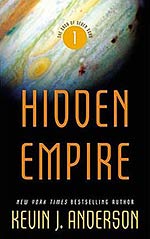
![]() attackofthebooks
attackofthebooks
12/29/2015
![]()
In Hidden Empire, man has reached the stars, spreading out and colonizing them, but not without help. The Ildirans have given man the stardrive, an inexpensive way to cross the vast distances of space in a fraction of the time that it takes light to travel. Other than the Klikiss, an extinct race whose archaeological remains are scattered on disparate planets, only humanity and the Ildarans remain as sentient species, and they are partners, at peace.
Or so they think. When human scientists execute and experiment using Klikiss technology, found among the extinct species' ruins, they turn a gas-giant planet into a small star and inadvertently destroy an entire population of the as yet unknown hydrogues living there. Provoked and without seeking explanation or apology, the hydrogues declare war and cut off access to the only fuel source for the stardrive, effectively starving disparate human populations reliant on Earth for resources.
Published first in 2002, Hidden Empire is the start of Kevin J. Anderson's The Saga of the Seven Suns series, which itself is the start of a multi-series epic. Given how prolific Anderson is (look him up-his name is synonymous with "productive writer"), I thought it was a bit strange I'd never read anything by him. In addition to his own original fiction-like the Seven Suns series-he's also written in both the Star Wars and Dune universes and has over 50 best sellers. He also runs Wordfire Press, which publishes a lot of science fiction and fantasy, including other authors I have read and enjoyed. After I heard him speak on a panel at Salt Lake Comic Con, I figured I ought to add some Anderson to my repertoire (and shelf). In addition to his book on productive writing, I picked up Hidden Empire since Anderson was then in the middle of promoting the first book in the second series in the Seven Suns universe (which would also later be Hugo nominated).
For a guy who dictates his books on walks in the Rocky Mountains, Anderson sure does come up with some clever and creative plotting. The Saga of the Seven Suns imagines a world under the control of corporatist/capitalist powers in the mold (both literally and figuratively) of the Hanseatic league of the 15th through 19th century. They designate a king as a figure-head ruler of Earth, though humanity's populous don't know any better. The Hanseatic league's control of humanity has pushed the independent and free minded to hide in uncharted star systems, in asteroids, and other secret places.
Meanwhile, the Ildirans are an old race, their own history obscured even from themselves. And yet, they know more than they let on, and it soon becomes clear that they are less allies to humanity than they seem. When the hydrogues attack Earth, the Ildirans turn a blind eye, and humanity finds itself alone against an enemy it neither knows nor can oppose.
It's a fun read, though if I had one complaint-and it's a small one-it's that Anderson's voice tends to be expository. He lays out what is happening in clear, unequivocal terms that leave nothing to the reader to anticipate or guess. One need not guess, because Anderson tells you. But what Anderson loses in exposition he more than makes up in epic scope. His tale spans the reaches of space and is a multi-pronged adventure. I look forward to reading A Forest of Stars, the second in The Saga of the Seven Suns series.
http://www.attackofthebooks.com/book-review-hidden-empire-by-kevin-j-anderson/